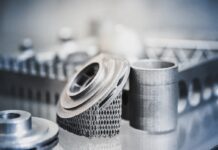
Industrial additive manufacturing company, Titomic Limited, has signed a commercial R&D agreement with RMIT University to manufacture high-performance, metal demonstration samples for satellite parts using its proprietary Titomic Kinetic Fusion (TKF) additive manufacturing process.
The study – to be carried out on behalf of aerospace and defence giant Lockheed Martin – will assess the capabilities of TKF to create structural satellite parts made from a high-performance metal, while also analysing the various capabilities of both traditional and additive manufacturing methods relative to radiation shielding within satellites.
Titomic’s Managing Director Jeff Lang said the joint research project could also lead to commercial opportunities for Titomic within the space and defence sectors following the successful validation of the additively manufactured demonstration satellite parts.
“Titomic is excited to be involved in this RMIT joint research initiative alongside the global defence and aerospace prime, Lockheed Martin, which will provide significant mutual benefit for all involved,” Mr Lang said.
“As we demonstrate the unique capabilities of Titomic Kinetic Fusion® for the additive manufacture of satellite structures, using high-performance metals and superalloys, we are also enabling exponentially faster production to reduce lead-times for the space industry, from months to hours, compared to traditional processes.”
RMIT University, Professor Milan Brandt, said the University’s Centre for Additive Manufacturing was looking forward to working with Lockheed Martin and Titomic to further refine the advanced manufacturing methods for protection of satellites from space radiation.
“The combination of additive manufacturing and highly-dense materials for this application offers new opportunities for not only increased radiation resistance but significantly reduced lead times for the manufacture of new satellites,” Mr Lang concluded.



















